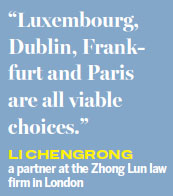Bank to switch from UK after Brexit

China Everbright Bank will relocate its European business to Luxembourg after the United Kingdom leaves the European Union, which could be as early as 2019.
The bank announced last week that it had received approval from regulators in the tiny nation to set up an office as it puts together contingency plans in the wake of Brexit.
In a referendum last year, the UK electorate voted narrowly to withdraw from the EU after more than 40 years in the trading bloc.
"The decision by China Everbright Bank (to) move to Luxembourg fits into the trend of Chinese banks trying to expand into European markets to negate potential Brexit-related risks," says Li Chengrong, a partner at the Zhong Lun law firm in London.
The UK currently enjoys "passporting" rights, which allows the City of London and the rest of the financial industry in the country to conduct business in the 27 other EU nations.

But when the UK leaves the trading bloc, it is likely to lose these rights.
"Uncertainties with that have prompted many Chinese banks to consider opening or expanding offices inside EU countries, so they can continue to sell their products.
"Luxembourg, Dublin, Frankfurt and Paris are all viable choices," Li adds.
China Everbright Bank is following six other Chinese lenders that have moved to Luxembourg.
They are Agricultural Bank of China, Bank of China, Bank of Communications, China Construction Bank, China Merchants Bank and Industrial and Commercial Bank of China.
Shanghai Pudong Development Bank has also applied to open a subsidiary in Luxembourg. Its application awaits approval from regulators in China and Luxembourg.
cecily.liu@mail.chinadailyuk.com
(China Daily European Weekly 08/11/2017 page26)
Today's Top News
- Pakistani minister hails high-tech ties with China
- China-US trade ties crucial for global growth
- Prospering Xizang sees surge in overseas visitors
- Central govt has final say on reincarnation of Dalai Lama
- Manila fueling tensions with its solicitations: China Daily editorial
- Bundling trade with other issues coercive approach demolishing rules-based order: China Daily editorial






























